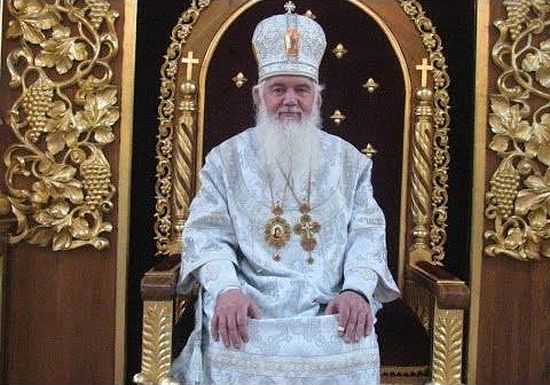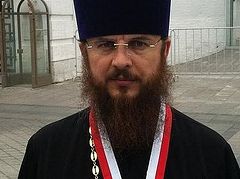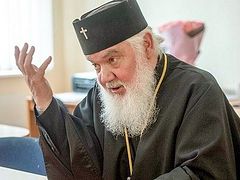Introduction by Matfey Shaheen:
The author of this article, one of a series on Western Ukraine, is the well-known Ukrainian Archpriest and Professor Rostislav Yarema, who was born and raised in the region of capital of Western Urkaine, Lviv. Father Rostislav is a Doctor of Theology and one of the most qualified experts in the Moscow Patriarchate on matters relating to Orthodox history in Western Ukraine and Poland.
Father Rostislav is also a giant in the academic and theological world as well, having great authority in matters of Orthodox history in Ukraine, as well as Poland and Russia. He is a graduate of Moscow Theological Academy at Saint Sergius Trinity Lavra in 2010, with the level Candidate of Theology (similar to a Ph.D. in Russia). He then completed his doctorate degree at the Christian Theological Academy in Warsaw, Poland, and was awarded with the title of professor.
In this part of his series of articles appearing on OrthoChristian.com, Fr. Rostislav talks about a main bone of contention in the formation of the so-called “Orthodox Church of Ukraine”.
The key issue in the discussion of the so-called “Orthodox Church of Ukraine” (hereinafter OCU) was and remains the question of apostolic succession of the “hierarchs” of the schismatic denominations of Ukraine, recognized by the Ecumenical Patriarchate and lastly received “in their existing ranks”. This is precisely the stumbling block to the reception or recognition of the OCU by the rest of the Autocephalic Orthodox Churches, even those which are closely connected by historical and national ties with the Patriarchate of Constantinople.
And if no one calls into doubt the former metropolitan of Kiev Philaret (Denisenko), who was originally properly consecrated as a Bishop but subsequently deposed and anathematized, then many questions arise concerning the canonicity of the consecration of the former primate of the Ukrainian Autocephalic Orthodox Church (hereinafter UAOC).
In Ukraine, it is widely known that the “Metropolitan of Lviv,” Makary (Maletich) and a number of “hierarchs” of the former UAOC, lead their “succession” from the self-declared impostor Vikentiy Chekalin. This fact is also known in other Local Churches, about which Archpriest Anastasius Gotsopoulos vividly writes. Constantinople’s supporters attempted to refute this information on the site “Φως Φαναρίου – Phos Phanarou” stretching the threads of continuity from Makary to Philaret.
Similar information is disseminated in those Local Churches who doubt the canonicity of the "episcopate" of the OCU. Let us try to analyze how solidly based these theses are justified, to which the author of a publication in Phos Phanarou appeals, defending the hierarchical dignity of Macary (Maletich).
First of all, it should be noted that this publication is replete with a great deal of unreliable information. For example, a certain Varlaam Ilyenko mentioned in this article is actually a mythical figure, not really existing. None of the “catacomb” denominations of Russia and Ukraine (and the lists of their “episcopates” are well known) have ever had such a “bishop” among them.
In April-May 1990, in Lviv, the former bishop Ioann (Bodnarchuk) together with Vikenty (Chekalin), who pretended to be a “bishop of the catacomb church”, “ordained” the first “hierarchs” of the UAOC: Basil (Bodnarchuk), his brother Ioann (Bodnarchuk), and Andrew (Abramchuk). Shortly after the “consecration,” Vincent (Chekalin) attempted to join the Lviv Roman Catholics. The attempt failed, as it turned out that he was an imposter.
To save the “canonical status of the hierarchy” of the UAOC, Ioan (Bodnarchuk) disseminated a rumor that the canonical Archbishop of Dnipropetrovsk and Zaporozhye Varlaam (Ilyushchenko), who had in fact died in September of the same 1990, and had never shown sympathy for schismatics during his life, secretly took part in the “ordinations”. This ridiculous version of events has been refuted; then, among the supporters of the UAOC, a legend spread about a certain “Varlaam Ilyenko, bishop of the catacomb church,” who ordained the “episcopate” of the UAOC. Documents and eyewitness accounts do not confirm this legend.
The story alleging that the so-called “Archbishop of New York” Anthony (Shcherba) (since 1995, Metropolitan of Hierapolis of the Ecumenical Patriarchate) secretly preordained the “hierarchs” of the UAOC is also not trustworthy.
- There is no documented evidence that Anthony (Shcherba) re-ordained the “Chekalin hierarchs” of the UAOC. Not one of the researchers of the history of the hierarchy of the Ukrainian schism (archimandrite Oleksandr Drabynko, V.I. Petrushko, Archpriest Rostislav Yarema, etc.) are aware of this happening. In the official biographies of the “Chekalin hierarchs” of the UAOC (for example, Andrey (Abramchuk), only the date of the “Chekalin ordination” is indicated;
- The hierarchs of the canonical Ukrainian Orthodox Church, Metropolitan Anthony (Fialko) and Archbishop Panteleimon (Romanovsky) were actually “ordained” by Anthony (Shcherba) in Kiev, however not in 1993, but instead in 1991. In 1992, together with a group “Hierarchs” of the schism, they returned to the canonical Church, and were re-ordained – therefore it follows that they did not consider their own previous “ordinations” valid;
- Until 1995, Anthony (Shcherba) himself did not possess apostolic succession, as the Patriarchate of Constantinople recognized. In the process of joining with the Church of Constantinople in 1995, Metropolitan Anthony (Shcherba) like all the hierarchs and clergy of the “Ukrainian Orthodox Church of the USA” were secretly re-ordained. This, in particular, was testified to more than once by Archbishop Vsevolod (Maidansky) of Scopelos during his communications with the hierarchs of the Ukrainian Orthodox Church. Constantinople never refuted this information.
Makary (Maletich) was “ordained” as a “bishop” on November 3, 1996, by “Patriarch” of the UAOC Dymytriy (Yarema), and “hierarchs” of this structure “archbishop” Igor (Isichenko) and “bishop” Mefody (Kudryakov). Let’s review the line of “ordinations” among these three people.
Dimitri (Yarema) was “ordained” on September 5, 1993, as a “bishop” by the Chekalinites (Petro (Petrus), Mikhail (Dutkevich), Feoktist (Peresada) and Igor (Isichenko). Two days later, on September 7, 1993, he was elected as the UAOC’s “patriarch” and the UAOC’s “enthronement of the patriarch” took place on October 14, 1993. It is impossible to imagine that a little-known schismatic “bishop” from across the ocean could secretly “re-ordain” the newly elected “patriarch.” This fact could not be hidden in the UAOC, and Dimitri (Yarema) would never agree to that.
As for Igor (Isichekno), who participated in the “consecrations” of Dimitri (Yarema) and Macarius (Maletich), it was his “Chekalin ordination” that prevented him from joining the Uniate Ukrainian Greek Catholic Church (UGCC): based on the evidence we have, the Roman Curia did not approve of his joining the Greek Catholics due to his lack of Apostolic succession.
In 1992, “Metropolitan” Philaret (Denisenko), already in the schism and defrocked, attempting to subordinate the structure of the UAOC to himself, attempted to secretly rearrange the “Chekalin hierarchy”. But not all the hierarchs of the UAOC agreed to this (it is reliably known that Vasily [Bodnarchuk] refused), and some of them (including Dimitry (Yarema) and Igor (Isichenko) never joined with "Metropolitan" Philaret ( Denisenko).
In 1992, “Metropolitan” Philaret (Denisenko) “re-ordained” the future “patriarch” of the “Kiev Patriarchate” Vladimir (Romanyuk). Lastly on August 17, 1995, together with the “bishop” Izyaslav (Karga) (also ordained by Philaret), they “ordained” as a “bishop” the future head of the UAOC Mefody (Kudryakov), who participated in the “ordination” of Makary (Maletich).
Thus we can see that of the three schismatic hierarchs who “ordained” Makary (Maletich), one of them had “succession” from the defrocked Philaret (Denisenko), and the other two did not have any other “ordinations” other than that from Chekalin.
And therefore, the “ordination” of Makary (Maletich) did not possess apostolic succession.
The arguments of the author of the post on Phos Phanarou concealed ecclesiological relativism on the verge of sacrilege and banal theological illiteracy. In his opinion, “to re-ordain” schismatics with dubious consecrations is “ignorance”, which answers to “contemporary flawed ecclesiology”. He asserts no one ordained the Apostle Paul (!), which means that Apostolic succession is not so significant in this issues. According to that author’s opinion:
- “The Church is the steward of grace, and when she says that someone is a bishop, this is without a doubt a continuation and succession of the true way of thinking of the Fathers.” So, it turns out that in order to become a bishop, apostolic succession is not necessary. The judgment of the Synod of Constantinople alone is enough.
- The desire for autocephalic independence justifies not only the “consecration” of the Russian “catacomb” churches (analogous to the Greek Old Calendarists) but even the “consecration” of Vasily Lipkovsky (he was “ordained a bishop” by lay people, deacons, and priests alone).
But such an approach does not correspond to the Tradition of the true Church, which always received into communion in the existing rank those who:
- Possessed apostolic succession;
- Came with repentance, renouncing heresy or schism;
- Was received by his legitimate Church authority from which he had fallen away, and not through an appeal to the Patriarch of another Local Church.
Consequently, the former Metropolitan of Kiev Philaret (Denisenko), and much less the pseudo-Metropolitan Makariy (Maletich) both can neither claim the episcopal dignity, or even lesser degrees of the priesthood (see the 29th rule of the Council of Chalcedon). According to Church canons, they shouldn’t even dare to hope for re-ordination, since, being legally deposed from their dignities, they can no longer be raised to a holy order.
Unlike the teaching of the Roman Catholic Church on the indelibility of the priesthood,[1] the Orthodox Church holds that a deposed priest[2] remains forever deprived of the right of priesthood, deprived of the name and honor of the priest, ceasing to belong to the clergy, and becomes a layman, like he was before ordination (see also the 21st canon of the Trullan Council; the 3rd canon of Saint Basil the Great).





